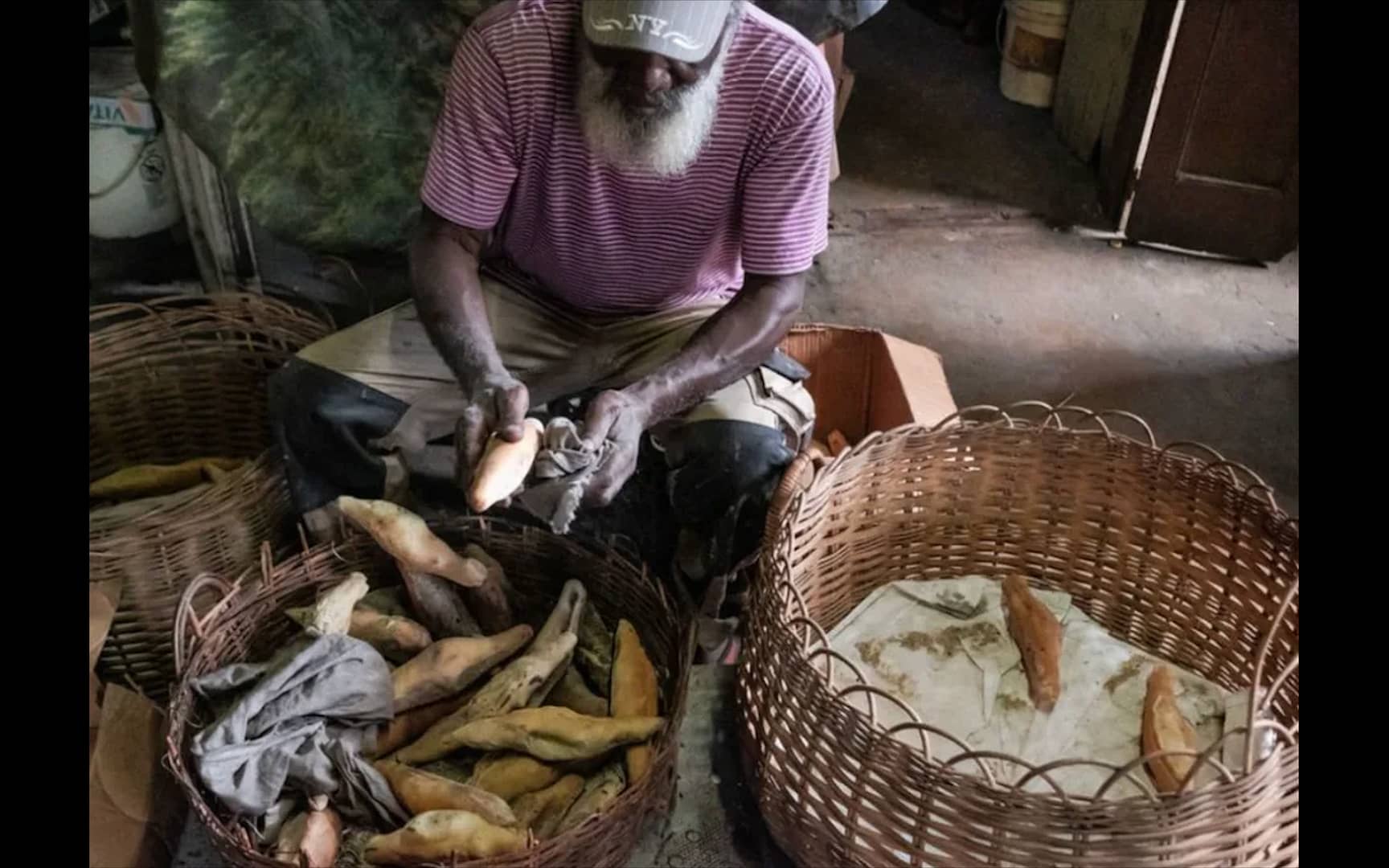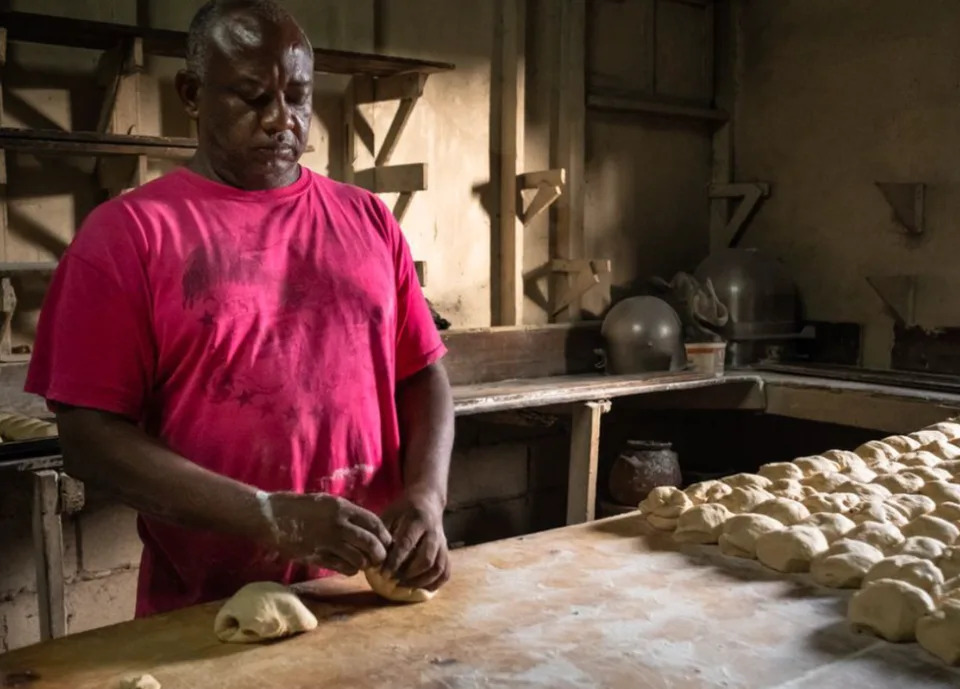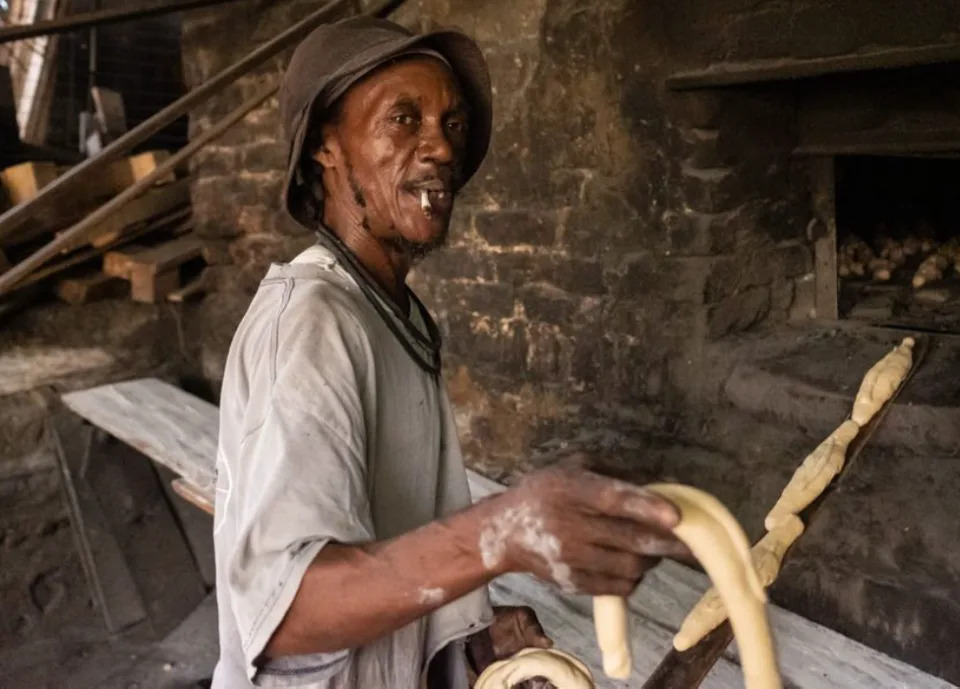
By Gemma Handy/BBC: Dawn has barely broken, and Alton’s bakery in a side street on the outskirts of Antigua’s capital is already abuzz with activity.
A baker is using a long plank to place loaves into a vast wood-fired oven. Someone else has the task of wiping the ashes off the bread when it comes out, filling the room with its comforting aroma.
In an adjacent room, two men are deftly shaping dough by hand into buns ready for the next batch.
Before the morning is out they will have made several hundred of these, to be sold in tiny family-run stores island-wide, or as breakfast for the hungry customers milling in and out, clutching still-warm loaves wrapped in brown paper.
Outside in the distance, a behemoth cruise ship looms, incongruous amid this tableau of simple wooden homes.
In the vibrant suburb of Gray’s Farm, a world away from the white sand beaches and luxury resorts tourists flock to Antigua to enjoy, Alton’s is a linchpin of community life.
It’s an image mirrored across the Caribbean island where “bread shops” are as much a meeting point, a place to share gossip and a joke, as somewhere to grab an affordable snack.
Recipes and techniques – passed down from residents’ African ancestors – and sometimes equipment too have remained unchanged for generations.

Rudolph Orr, whose family opened Alton’s a century ago, rises at two in the morning seven days a week to start baking.
Over the last year, however, the soaring cost of flour has taken a massive bite out of the shop’s meagre profit.
Like everywhere else, Antigua has been badly hit by the rising cost of living, exacerbated by the wheat blockades in Ukraine and many countries’ subsequent curtailing of exports.
But for Mr Orr, passing on the extra costs to his customers is unthinkable.
“If we did, some families around here wouldn’t be able to eat,” he says. “We try to help the people. For a family of seven or eight, an extra dollar on each bread would be a big increase. We are helping them survive.”
It’s an ethos passed down to Mr Orr from his forefathers, along with the vintage tools he still uses to prepare his products.
Flour imported from neighbouring islands has almost doubled in the last 12 months.
Alton’s has been forced to up its price by a nominal few cents – but a personal-size loaf, slathered with butter, cheese or salami, sells for the equivalent of just $0.75 (£0.62).
Wood-fired ovens are something of a dying tradition in Antigua. But, for the handful of bakeries that still use them, switching to a modern counterpart is inconceivable.
“Electric ovens are much easier and have less smoke,” Mr Orr concedes. “But people like our bread for the smoky flavour and crunchy texture.”

Kent Augustine, who is picking up a loaf on his way to work, says the use of local cassia and tamarind wood gives it a unique flavour.
“Prices have gone up everywhere but the bread is still very reasonable,” he adds.
A contemporary oven would undoubtedly be safer, too. Baker John Peters laughs when asked if he ever gets burnt.
“All the time,” he says, rolling up his sleeve to reveal the marks.
At another bakery closer to St John’s, baker Tindell Joseph says the South Street bread shop has been a part of the community for decades.
Mr Joseph learnt the trade many years ago and says the only thing that has changed is the use of vegetable fat in place of lard.
“This place has a history,” he tells the BBC, surveying the spartan surroundings comprising a large wood oven and long table used to knead and shape the dough.
“People used to come here to see the previous owner. I clown around, share a little chatter; people like that. I play music too – soft rock, reggae, calypso, words with a message. If no music is playing, people ask why,” Mr Joseph grins.

Regular customers come from as far as the other side of the island to pick up their morning loaf before heading into St John’s for work.
“Fridays to Sundays are our busiest days. People come in to buy bread to eat with their Sunday breakfast of saltfish and greens,” he says.
Bakery owner Lolita Peters bought the business five years ago when food prices were still relatively stable.
In addition to flour, sugar has also increased by 25%, she says.
“We’ve had ups and downs, but the bakery means a lot to the community and the country at large. They say my bread is the best,” Ms Peters explains.
“I only put my price up a little because I consider there are two of us in the business – the customer and I – and up to now the customer is still on the same wage as before.
“They appreciate that; lots of them come and thank me.”
What the future holds for these traditional shops in the face of unprecedented financial challenges, coupled with an ageing generation of old-style bakers, no-one really knows.
Ms Peters’ granddaughter Ariel Hughes has been helping out at the South Street outlet for most of her life. But, at 18, she has other ambitions.
“I plan on living abroad so I will not be doing this,” she says. “I want to learn cosmetology and do makeup, hair and lashes.”
Ms Peters says she hopes one of her other grandchildren will eventually take over the bakery, but adds: “It seems like they have other interests.”
At Alton’s, Mr Orr says he’s tried in vain to convince his 22-year-old son to learn the trade.
“I try to teach him,” he says, over the noise of a chicken that has wandered in, announcing its arrival with a loud squawk.
“I tell him some day this will be his, but he seems more interested in modern things.”
Advertise with the mоѕt vіѕіtеd nеwѕ ѕіtе іn Antigua!
We offer fully customizable and flexible digital marketing packages.
Contact us at [email protected]

















They MUST struggle under the WICKED Gaston Led ALP Administration!
ABLP refuses to adopt the UPP measures: reduce customs duties on essential foods, raise minimum wage, raise government wages.
People don’t have money to spend. Inflation keeps rising by double digits.
So how the hell can people buy bread Gaston?
And let’s always remember the UNEMPLOYMENT CRISIS is a critical issue. People with jobs cant afford… and those without… just forget it… they are on the economic sidelines.
ABLP just sucks, it cannot be denied.
WE NEED JOBS. THERE ARE TOO MANY FAILED PROJECTS.
Employed people buy bread and everything else. More jobs means more commerce. Or is Gaston to dumb and deluded to understand?
We need UPP in Government to get some of these ALP failed projects brought back to life, to provide jobs and an economic shot in the arm… using the Investment Authority or however else:
1. Sunny Hill Project (Resort in Falmouth/Bethesda area)
2. Beaches Resort by Sandals Resorts
3. Half Moon Bay Hotel
4. Morris Bay / Callaloo Cay Project
5. Hotel Resort on Pelican Island and Residences on Maiden Island
6. Labahia Hotel Resort & Condominiums (Marble Hill Business Hotel) by WIOC
7. Long Bay Hotel Resort by WIOC
8. Valley Church Hotel Resort by WIOC/PDVSA
9. Amazon Call Center at Five Islands
10. Marriott Autograph Hotel at Yeptons
11. Beach Club at Fort James by Royal Caribbean Cruise Lines
12. Renovation and Expansion of Halcyon Hotel
13. Port Oasis Project at Side Hill
14. NAMCO acquisition of Jolly Beach Hotel
15. Best Western Hotel at Jolly Harbour
16. Marriott Courtyard Airport Hotel
17. Cedar Valley Golf Course Hotel
18. Mike Tyson Hotel
19. Bau Panel/UNOPS Project
20. The Yida Project
21. Willoughby Bay Project
22. Western Imperial Special Economic Zone (WISEZ)
23. Brova Idea Pearl Hotel – Partly Underwater Hotel
24. USD $300 Million Hotel from Investors in Holland
25. Paradise Found (Barbuda)
26. Armand Hotel (Barbuda)
Wicked Alp – I don’t recall you ever answering my question of where the money is going to come from to subsidize the higher wages.
I know, a major tax increase yes!!
Gemma would write and say what she feels because at the end of the day she can always go back to Hengland.
There are times when traditional is as good as or better than modern.
These baking traditions are worth preserving, but children also have a right to choose a different path than their parents. The bread shops should take on interested apprentices. They can sell the business to an apprentice when they are ready to retire.
The bakers in English Harbour make much money.
Why not go to Brownies. And get the story of baker’s life. One story of a baker’s life is not strange. Many of us that are used to doing things one way have to get with the times and change how we do things. England today is not England from many decades ago. Things change Gemma. Nothing really stays the same. Eventually all these little mom and pops shops will find themselves on the breadline. People have to invest in more efficient ways of doing things. And that is why we need to bring our children in the business early and educated them, so that they can implement the changes that are needed in order to keep the business alive.
@From The Sideline…
…#Generational Wealth is not preached, taughted, lived for the most part in Our Culture. Therefore, while changes are inevitable in life, due to lack of conformity to such the ideas of GENERATIONAL WEALTH building, taking traditional methods of mixing flour, water, leavening, grease and baking them in brick ovens with wood fire, will never be transformed into such things as PIZZA which is now one of the go-to foods for our youths/children.
The old-fashioned Brownie or even Miss Babee – Bread_Butter_Cheese MUST now be transformed into Pizza! Pizza! Pizza!
Da #SAUCE matters!
Jumbee_Picknee son of #Mami_Wata and #Papa_Elegba!
I do not completely agree with you. If your parents started a business, it is up to you to take the business to the next level. or the business will die. Doesn’t mean you have to move away from the core of the business. I look at my friend Blowie in Pigott’s. Look from where he brought his bread shop? But he could and should have gone further. Brownies have been doing business the same old way; however, their strategy is to branch out in lots of shops all over the Island. Look how Epicurean started their own bakery and filled the void that local bread shop didn’t do. I find it hard to see that local bread shops cannot make 7 or 10 grain sliced bread, Rye Bread, or Salt Free Bread for elderly people with various illnesses. A baker in the USA, Canada or England makes a variety of bread. And they also branch out and make various cakes. Here you have to go and buy a cake from a specific person who you know from friends, or you go to Epicurean. It’s like our bakers are only trained to do one thing. If the children are serious about taking over the family business, they have to go and educate themselves in the bakery profession and take the business to the next level. I remember Philton, who now does it from home as well.
Comments are closed.